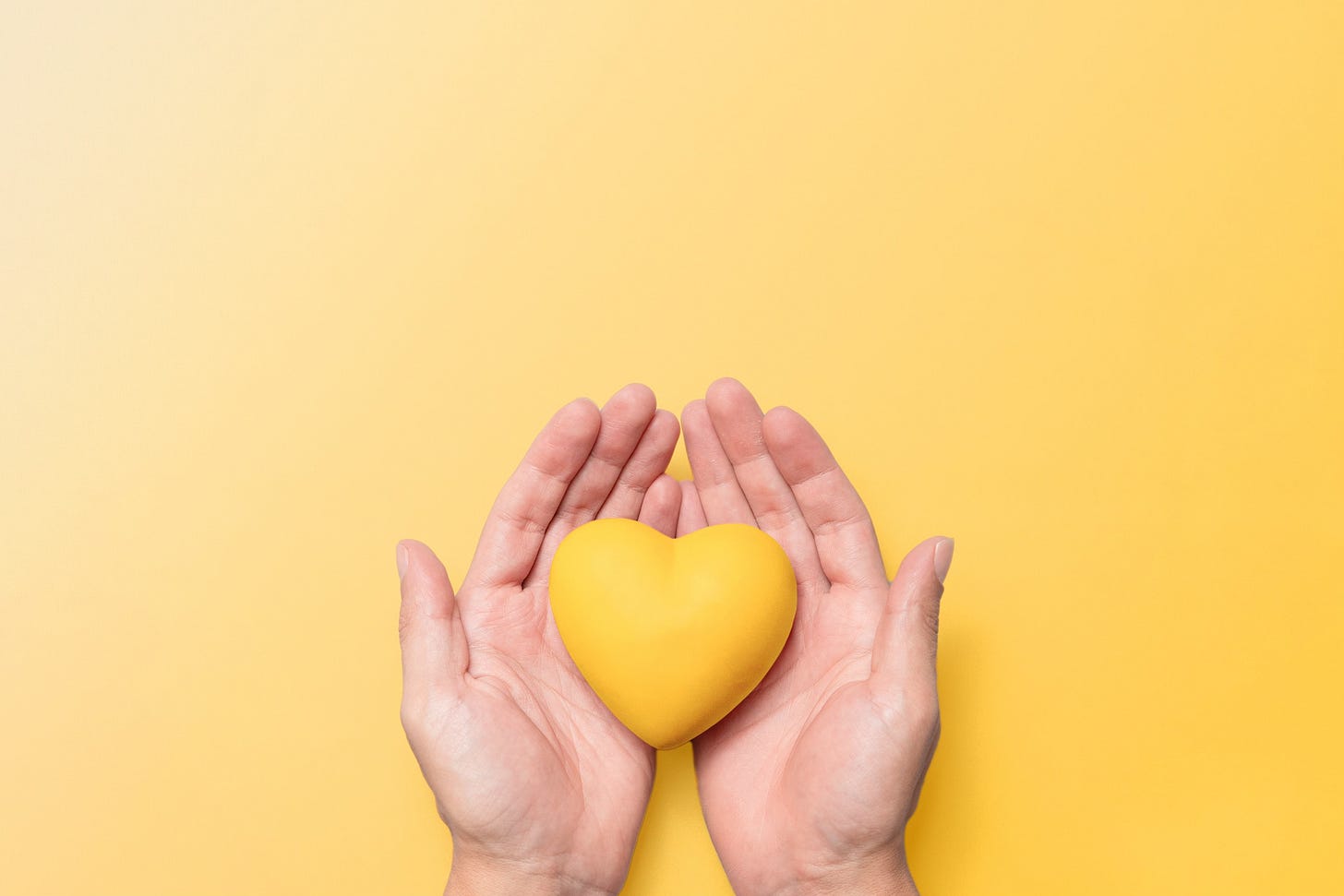How to stop being a jerk to yourself
Everything you need to know about cultivating self-compassion.

Hi folks,
I know that things are hard right now. Like, really hard. Every day there is another piece of terrible news. It’s hard to find solid ground.
With my patients, I'm finding that everyone is less productive than usual (because our attention is being divided and cannibalized), and then beating themselves up for not being productive. If this is you right now, please know you are not alone.
This is a longer post, but I wanted to put everything I tell my patients about self-compassion in one place . My intention is that this is something you can save, screenshot, print out, and use as a reference when you start beating yourself up. I hope you can come back here whenever you need to, and get a much-needed reminder of on how to treat yourself with the respect and care that you would bring to a friend.
In my book, Real Self-Care, I write about four self-care principles:
Boundaries (which I wrote about here in January)
Compassion
Values
Power
Today, I want to help you learn how to cultivate the skill of self-compassion.
I always thought of self-compassion as a sort of woo-woo thing, like crystals and affirmations. Or maybe that going easy on yourself was actually just an excuse for less than stellar performance. But then, as I learned how to practice my own real self-care, I realized that self-compassion is much more technical than that. It’s actually a skill to be practiced and honed. It’s focused on having a different type of conversation with yourself than the one many of us are having in our heads all the time (like the one with our inner critic who is constantly telling us we are not good enough).
Self-compassion isn’t telling yourself you’re right, or that you are doing a good job. Self-compassion is actually about making those critical thoughts LESS POWERFUL by not arguing with them or trying to disprove them.
Here’s your quick Compassion Checklist:
Compassion is something you must give yourself; you can't expect it to always come from the outside.
Your inner critic may have gotten you this far in life, but she is not the only voice that matters anymore.
You don't have to be down and out to accept help.
There are many different definitions of self-compassion, but the three pillars I use are below. (These are based on work by Dr. Kristin Neff, who is the foremost researcher on self-compassion.)
Three pillars of self-compassion
Self-kindness instead of self-judgment
Recognizing shared humanity (we all struggle, it’s part of a universal experience)
Being curious about your thoughts as opposed to accepting them as the capital T truth
Once you start to practice boundaries (the first Real Self-Care principle), if you are a people-pleaser or a type-A person, you will probably start to feel guilty, or berate yourself for being selfish, or worry about what other people are saying about you. You’ll need to practice self-compassion to help get a handle on these difficult thoughts and feelings.
On giving yourself compassion:
Think of guilt as a broken check-engine light
In Real Self-Care, I share a story that happened when I was running a postpartum women’s group in Washington, DC. A woman with a newborn was at the new moms group, and she had just found out that the HR department at her work had made a mistake, and she actually had two extra weeks of paid maternity leave available to her. She wanted to take the leave, but it was a busy season of the year for her team. She described feeling guilty for leaving them hanging on short notice, and, in the same breath, knew that if she left those two weeks on the table, she would feel terrible about not having that time with her new daughter.
I said to her, “Isn’t it interesting that no matter what decision you make, your brain makes you wrong?” That made her stop and say, “I never thought of it that way. I thought that if I ruminated long enough, I’d come up with the perfect response. Or that I’d stop feeling bad about the direction I choose.”
This story is why I say that guilt is like a broken check-engine light on your car dashboard. It’s like when you got the oil changed and have new brake pads and everything is FINE, but there is a stupid light that keeps blinking. It does not give you any meaningful information! It’s broken.
Your job is to remember that you can move forward even when you feel guilt. Just because you feel guilt doesn’t mean you are making the wrong choice. Guilt does not need to be your compass.
On recognizing shared humanity:
Accepting help and microdosing your capacity to receive
I was talking to a patient during a therapy session who had two little kids, and both she and her husband worked full-time out of the house. She mentioned that her husband was going to be away for the night soon for a work trip, and her sister, who lived just down the street, offered to come over to help with dinner and getting the kids bathed and in bed. But instead of accepting this offer, my patient told her sister, “No, it’s okay, it’s just one night.”
I asked her, “Why did you say no when she offered to help?” My patient said, “Well, you know, she's busy, and I don't want to bother her and put more on her plate.” “But you didn’t even ask, she volunteered,” I gently responded.
So many of us wait until we are literally on the floor drowning in everything we have to do before we ask for help, but in this instance she had somebody in her life who wanted to be there, but she turned that help down.
This story makes me think about the work of the Gottmans, the famous couples therapists. They talk about bids for connection in relationships, which is when one person makes an attempt to connect, and the other person either turns toward that connection, or away.
I think that there are bids for connection in any relationship — and my patient’s sister was making a bid for community. And when my patient said no, it's fine, I can do it myself, she rejected that bid.
This is important to recognize, because the reality is that we as humans are social creatures, and we need each other. When you refuse to receive help, you were actually doing a disservice to your community. There's a ton of research out there that shows the pro social effects for the person who is giving the help. They get to be part of your inner circle, your team, there are literal health benefits. And after they help you, it’s much easier for them to ask for help when they're in a time of need.
I call the practice of allowing in help “microdosing your capacity to receive.” It basically means that we need to start saying yes to offers of help even when we don't think we need it, even if it’s just one night on your own with the kids. The point is that you need to learn to be interdependent and to accept help when it's offered. You have to say yes to these micro moments, because that's how you build the muscle of being comfortable depending on others. Then when you're in a crisis, and you really are stressed and you need help, you already have practice asking for it.
That's what compassion actually is: a practice of giving and receiving help.
On being curious about your thoughts:
Developing psychological flexibility
The last principle is another way to describe what’s called psychological flexibility, which is a concept that comes from acceptance and commitment therapy. Psychological flexibility is a fancy term that means you are capable of having a curious and open-ended relationship with your mind. One way to achieve this is by practicing cognitive defusion, a tool which comes from Acceptance and Commitment therapy. Cognitive defusion literally means getting space from your thoughts. The concept focuses on distinguishing “yourself” from “your mind” or “your thoughts.” (That’s right: you are not your thoughts.) This allows you to develop curiosity about how your mind works, as opposed to being controlled by a fire hose of negative self-talk.
Cognitive defusion can be practiced in many ways, but here are a few ways to try it yourself:
The Sushi Train Metaphor by Dr. Russ Harris. Thoughts will pass by just like the plates of sushi on a conveyor belt, and we can learn to step back and watch them come and go rather than reacting to each one.
Distinguish between the content of a thought and the function. Let’s say you’re constantly beating yourself up because your house is messy and you feel like you can never get on top of the clutter. You could ask yourself, “How is this self-criticism serving me? Is it motivating me to clean? Is it making me feel worse about myself?” Instead of focusing on the content of the thought, focus on the function of the thought. Usually, when we are critical towards ourselves, the function of the thought ends up being keeping us stuck, in a rut, and down on ourselves.
Add a catchphrase. When you find yourself stuck in a mental loop of self-criticism, or worrying about situations that are largely out of your control, remind yourself that those thoughts are not you, but are instead a small part of what’s happening in your mind. When you notice that loop running, say to yourself, “There goes my mind again,” or, “I’m on the hamster wheel.” This helps as a shorthand to signify to yourself that your mind is in an unproductive state, and calling attention to it increases the likelihood of disrupting that pattern and bringing you back.
I can’t promise that the world will get any better — but I do know that if you practice these skills, you’ll be treating yourself with care instead of cruelty. You’ve taken a solid step toward learning how to better care for yourself today. Keep practicing, and while you do, remember to practice self-patience, too.
xo,
Pooja
From the Real Self-Care archives:
Three strategies for dealing with chaos
Deep breath. Let’s talk more about how we can take care of our mental health, survive, and keep showing up — for ourselves and for each other.
Paid subscribers get full access to the Real Self-Care archives.
You are reading Real Self-Care, the weekly email newsletter written by psychiatrist and bestselling author Dr. Pooja Lakshmin MD.
📚 Order my book, Real Self-Care, as an e-book, hardcover, or audiobook.
💬 Hire me for a real self-care keynote by sending a message on my website.
📲 For more Real Self-Care principles, read Boundaries 101.





